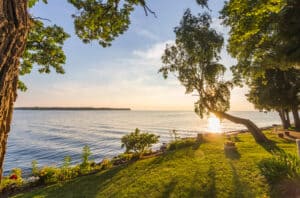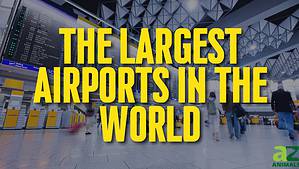Ever been on tour around Africa? Chances are that you’ve heard about its most populous country, Nigeria. According to official figures from the World Bank, Nigeria’s Gross Domestic Product (GDP) was approximately 440.78 billion US dollars in 2021. Hence, it doubles as the largest economy in Africa.
Nigeria is a West-African country on the Gulf of Guinea. It’s bordered to the west by Benin, Chad, and Cameroon to the east, the Gulf of Guinea to the south, and Niger to the north. As you might have guessed, the weather is tropical with varying wet and dry seasons, depending on where you visit in Nigeria, which might be one of the seven most populated cities discussed here.
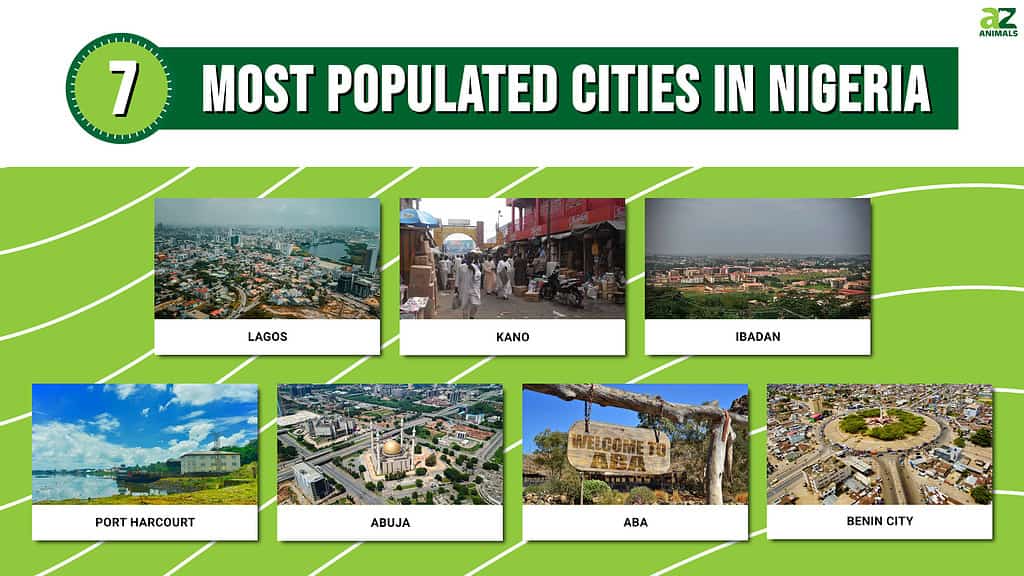
Perhaps the most interesting feature of the oil-rich country is its people. With an estimated population of more than 200 million people, Nigeria is home to 36 states and over 250 ethnic groups. The states are divided into six geopolitical zones: Southwest, Southeast, South, Northeast, Northwest, and Northcentral. Predictably, over 500 languages are spoken within the country, with Yoruba, Igbo, Hausa, Fulfude, Ibibio, Kanuri, and Tiv being some of the most common.
For a very long time, Nigerians in need of better employment and educational opportunities have looked to the country’s largest cities as sources of hope. Not only that, but these cities have also proven popular with businesses looking to invest in Africa. We went in search of the largest cities in Africa’s most populous country and compiled a list for your reading pleasure.
#1 Lagos
Lagos needs no introduction. When you think of a commercial nerve center in Nigeria, think of Lagos. The state is located in the country’s South-west region and was Nigeria’s capital until December 1991, when Abuja replaced it with Abuja.
Nevertheless, the state plays a significant role in the Nigerian economy. Besides being home to about 10% of the country’s population, Lagos state contributed 15.3% to the national GDP, according to the State’s Ministry of Economic Planning and Budget.
Wondering how Lagos became Nigeria’s economic heartbeat? Initially, it gained recognition as a British colony, then served as the administrative capital after Nigeria was amalgamated.
Lagos has the best infrastructure in the country thanks to its history as a colonial getaway and later as the nation’s capital. The availability of job and business prospects entices people from far and wide.
The southwest shore of Lagos Island is host to the primary business district, comprised of a rising number of multistory structures. The city’s commercial, financial, administrative, and educational hub is. The main manufacturing sectors in Lagos are electrical equipment, plastic products, car assembly, food, and beverage processing, pharmaceuticals, metalworking, furniture, and paint and soap production.
The Apapa seaport on Lagos mainland is one of the busiest seaports and is the primary outlet for Nigeria’s exports.
Regarding attractiveness for startups, Lagos takes the lead and has continued to set itself apart as Africa’s tech hub.
In essence, Lagos serves as the headquarters of the nation’s leading private organizations. Moreover, almost every indicator of economic activity in the country, including energy consumption, manufacturing activity, bank deposits, local and international air traffic, and maritime cargo freight, places the city in the lead. Therefore, moving to Lagos increases a person’s chances of finding a solid job and making a respectable wage in Nigeria.
Lagos is also known for its bustling nightlife, entertainment, traffic congestion, pollution, and the slum settlements in its suburbs.
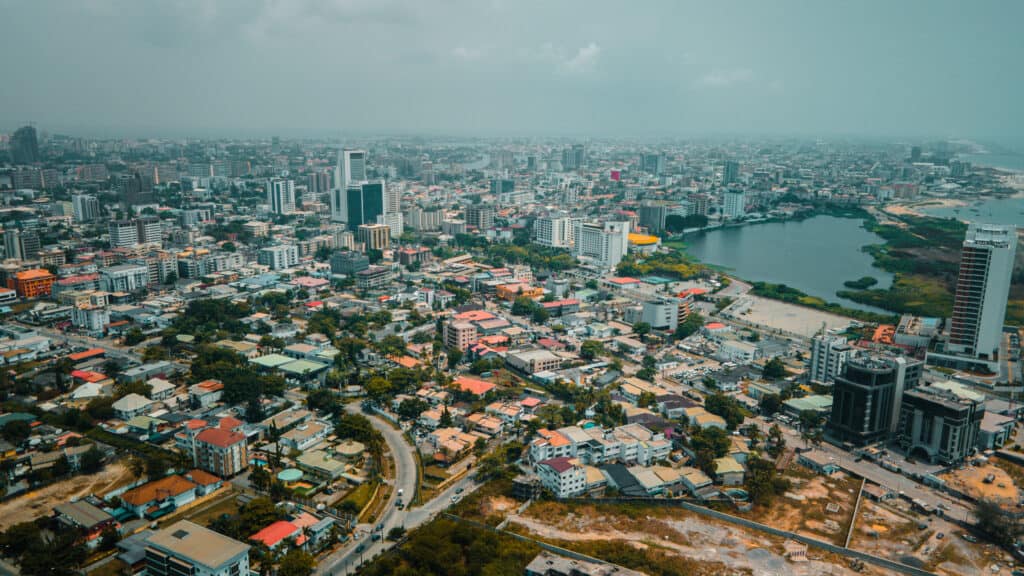
Lagos has the best infrastructure in the country thanks to its history as a colonial getaway and later as the nation’s capital. The availability of job and business prospects entices people from far and wide.
©iStock.com/Kehinde Temitope Odutayo
#2 Kano
Located in the northwest region of Nigeria, Kano is the second largest city in the country and the capital of Kano State. Like Lagos, it has a rich history of culture, tourism, and commerce. The state’s slogan is “center of commerce.”
It’s bordered to the northwest by Katsina State, the northeast by Jigawa State, the southeast by Bauchi State, and the southwest by Kaduna State. Although it’s predominantly Hausa-Muslim, Kano city plays host to people from other religious and ethnic backgrounds.
Long before the advent of colonization, Kano was a major route in the trans-Saharan trade. In the 1950s and 1960s, the city was known for its groundnut pyramids which sustained the economy through revenue accrued from export.
Despite the nosedive in groundnut production, Kano still has a reputable agricultural economy – prominent crops include millet, soybean, corn, cowpeas, onion, gum arabic, wheat, chili pepper, and garlic. Its large markets include Dawanau, Kanti Kwari, Kurmi, Sabon Gari, Galadima, and Yankura, while industrial estates are located around Bompai, Sharada, and Chawalla.
Expanding industrial zones within the city gave momentum to its responsibility of fostering sustainable livelihoods among residents. Over the years, Kano has benefited from a comparatively abundant labor supply from the surrounding areas and settlements. Without a doubt, this has contributed to its fame throughout the country as well as in the Northern region.
The city’s strategic advantages include a fast-growing economy, sizable land, and a reasonably affordable and reliable labor force.
Prominent industries in Kano include tanning, textile, enamelware, footwear, cosmetics, animal feed, food, and beverages.
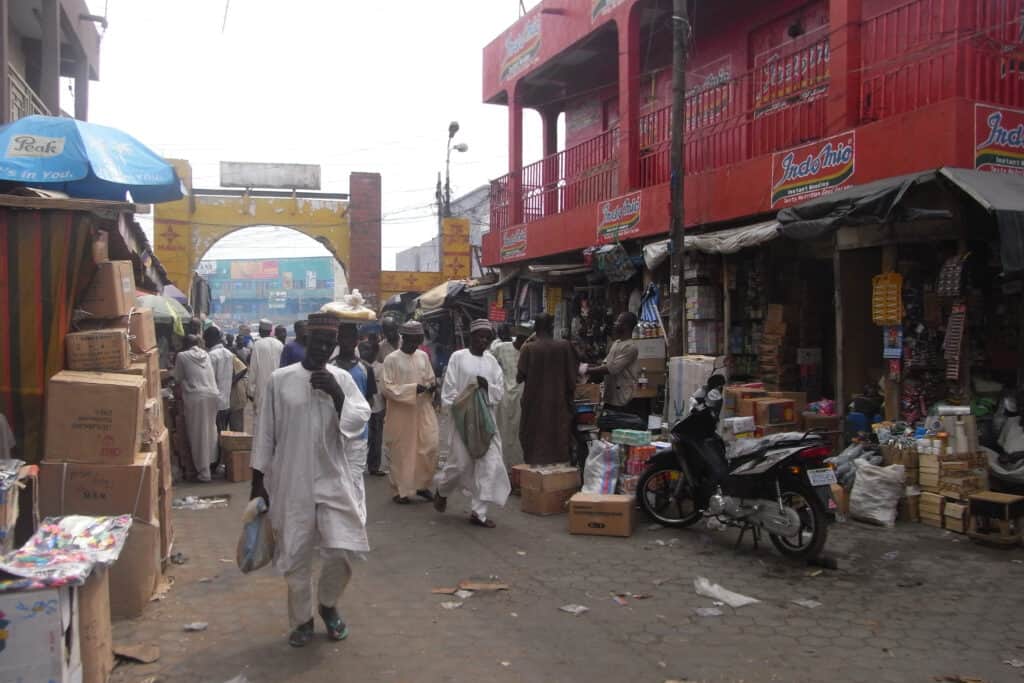
Kano’s strategic advantages include a fast-growing economy, sizable land, and a reasonably affordable and reliable labor force.
©StreetVJ/Shutterstock.com
#3 Ibadan
Ibadan was, in terms of surface area, the biggest city in Sub-Saharan Africa until 1970. Thus, there’s no doubt about its place on Nigeria’s largest cities list. It’s situated in southwest Nigeria, around 120 kilometers east of the international boundary between Nigeria and the Republic of Benin and 119 kilometers northeast of Lagos.
The city’s prominence was further strengthened during the colonial era and developed as a crucial hub for bulk trade. After a brief period of rubber industry growth, cocoa became the primary agricultural product in the area, luring traders from the South and North, including those from Lagos, Ijebu-Ode, and Kano.
The Cocoa House in Ibadan, built by the defunct Western regional government from the revenues generated from the agricultural trade, was the first skyscraper in West Africa. The city is also home to the first university established in Nigeria.
Agriculture, retail business, handicrafts, manufacturing, and services make up the bulk of Ibadan’s economy. The number of farmers in the city has decreased, although it is still substantial.
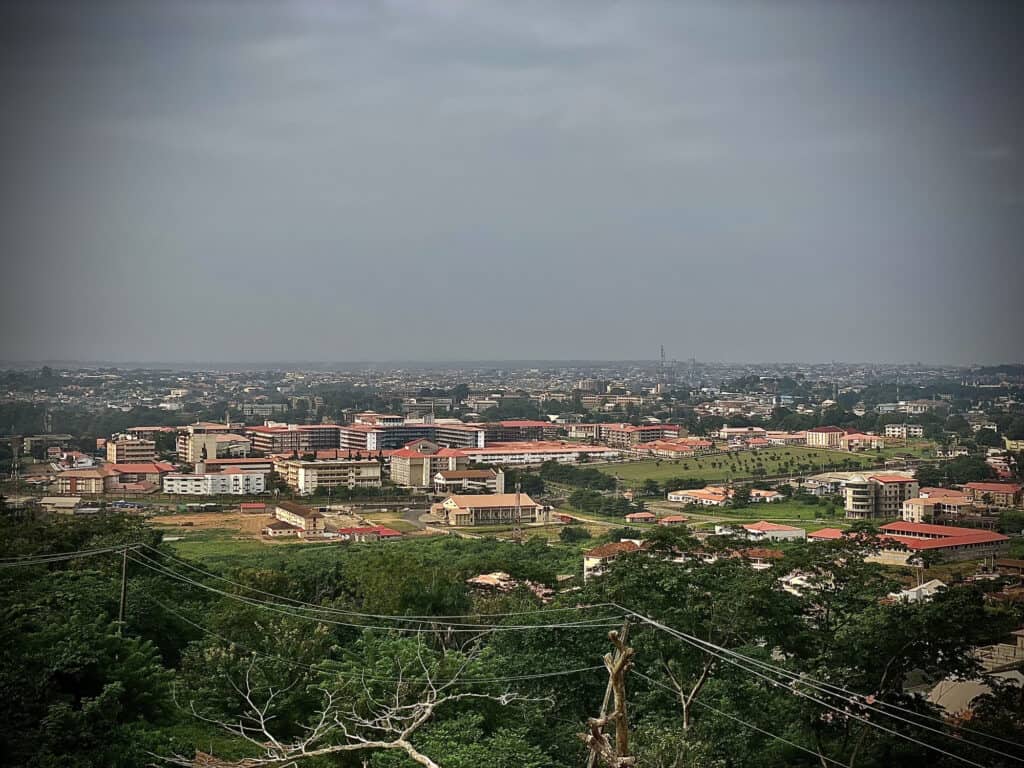
Ibadan was the largest city in Sub-Saharan Africa until 1970. Agriculture, retail business, handicrafts, manufacturing, and services make up the bulk of its economy.
©iStock.com/Bimbo Omopo
#4 Port Harcourt
This metropolis is located 41 miles upstream of the Gulf of Guinea along the Bonny River, an eastern distributary of the Niger River. Port Harcourt is the state capital of Rivers in southern Nigeria.
It started as a port built by the British colonial administration to export coal from the coal mines in Enugu. By 1958, the port had become one of the largest in the country, and it facilitated the export of the first shipment of crude oil from the oil-rich Niger Delta region.
Port Harcourt is one of the major industrial hubs in Nigeria with infrastructural development, partly because of the benefits derived from the Nigerian oil business. The Trans-Amadi Industrial Layout is a 2,500-acre industrial area that has a significant manufacturing sector that features the production of paper, glass bottles, aluminum, and tires.
The thriving late-night scene and entertainment options in Port Harcourt are also well-known. You can find many pubs, lounges, clubs, dance bars, and restaurants throughout the city. However, the city deals with poor air quality caused by the high volume of emissions.
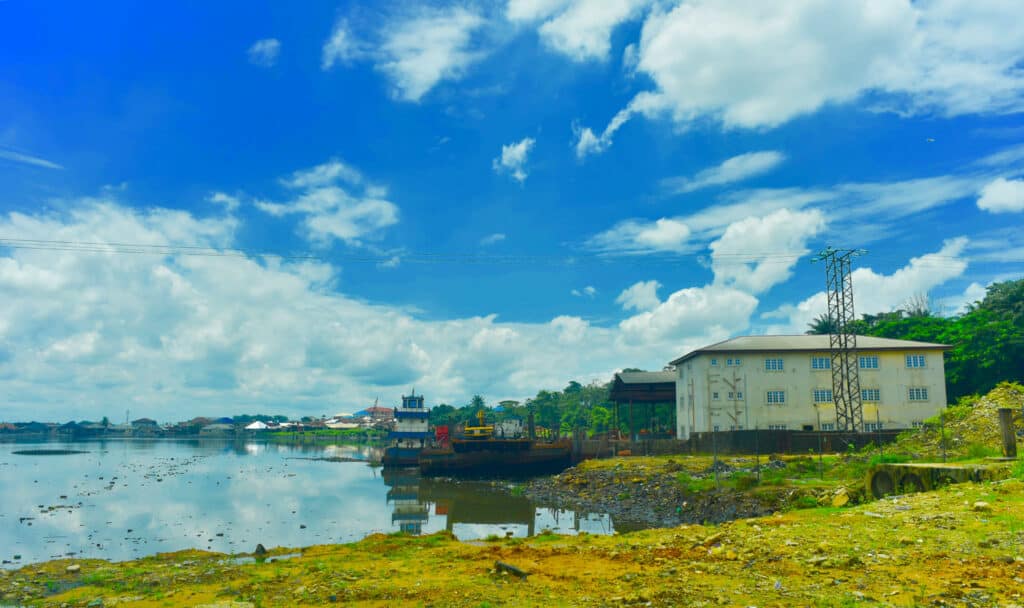
Once an important port for exporting coal, Port Harcourt is now a major hub for exporting oil.
©Alucardion/Shutterstock.com
#5 Abuja
Abuja, the national capital of Nigeria, is one of the planned cities in Africa. Following the master plan designed for the new capital city, the initial stages of Abuja were completed in the 1980s, and the city was officially recognized as Nigeria’s capital in December 1991.
The city has about ten districts, each with distinct, well-defined commercial and residential areas. The Central Area serves as the city’s main business district and is home to the offices of nearly all parastatals and multinational firms. Other important places in the Central Business District include The Three Arms Zone, so named because it contains the administrative offices of the federal government’s executive, legislative, and judicial arms. Also as the National Christian Centre, the National Mosque, Eagle Square, National Stadium, and the Nigerian Cultural Center.
Garki, Maitama, Wuse, Asokoro, Jabi, Gwarimpa, Apo, and Durumi are other districts found within the metropolis.
Being a purpose-built city, Abuja has a lot of parks and green areas for its residents. Located in the Maitama District of the city, Millennium Park is the largest public park in Abuja. In addition, the National Children’s Park, Almat Farms, and Resort are also attractive.
For shopping and recreation, Abuja is home to Jabi Lake mall, Dunes Center, Bature Brewery, Jabi Boat Club, Nike Art Gallery, and Gurara Waterfall, among others.
Expressways link Abuja with neighboring cities, and the city has an international airport for its teeming population.
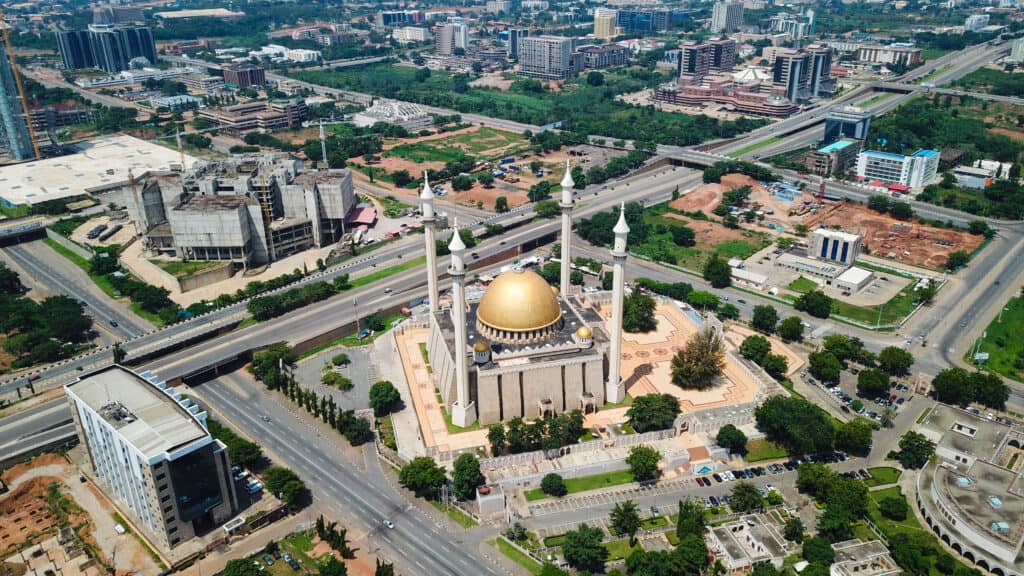
The capital of Nigeria, Abuja is known for the National Mosque.
©Tayvay/Shutterstock.com
#6 Aba
This list cannot be complete without the mention of Aba. It’s a city in Abia State, Southeast Nigeria, which is widely known as the region’s commercial center. It’s located at the intersection of highways from Port Harcourt, Owerri, Umuahia, Ikot Ekpene, and Ikot Abasi.
No doubt an industrial center, Aba is home to the Ariaria International market, which is one of West Africa’s primary markets and has earned the moniker “China of Africa” due to the production of clothing and leather products. As a testament to the city’s production prowess, it’s not uncommon to hear the term “Aba made” in Nigeria.
In addition to hosting a mega mall and brewery, Aba is known for manufacturing textiles, cosmetics, footwear, pharmaceuticals, handicrafts, and plastics.
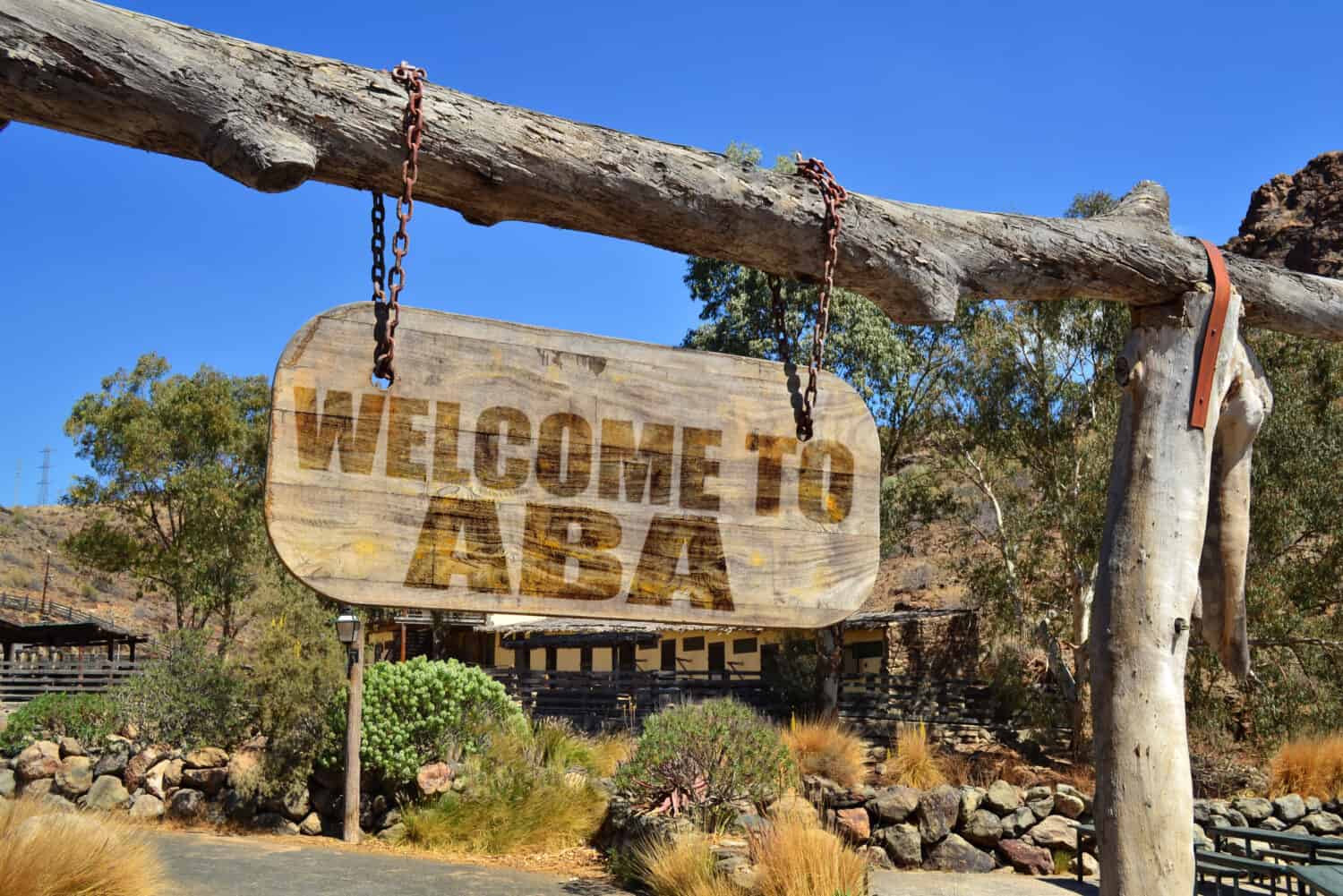
Despite the roughhewn sign, Aba is a commercial and manufacturing center in Nigeria.
©esfera/Shutterstock.com
#7 Benin City
This is one of Nigeria’s historical cities, and Edo State’s capital is located in the South-south geopolitical zone.
Benin was a flourishing kingdom between the 13th and 19th centuries before being attacked by a British expedition in 1897. They also took the Benin bronze sculptures away during the attack.
The city has a rich history of brass works, some of which date back to the 13th century, and its carvings in ivory and wood. To this day, some of the earliest artifacts of the kingdom are prominently displayed in its museum.
Besides being an oil-rich state, Benin is known for the export of palm kernels and palm oil. In addition, the city serves as a hub for rubber production in the country and is home to many processing facilities, including a facility that makes crepe rubber.
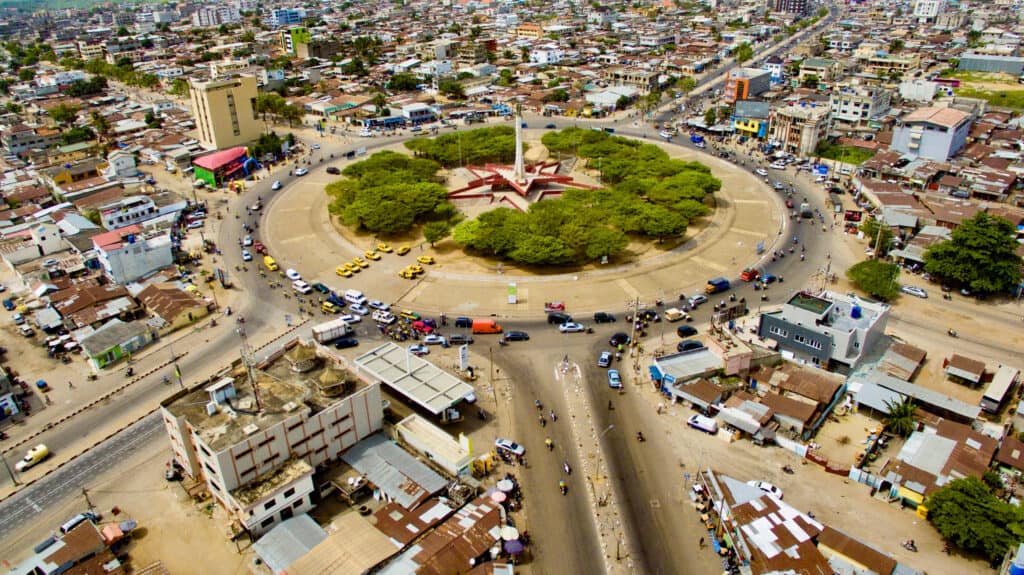
Benin has a rich history dating back to the 13th century. Today, the city is known for its rubber production, as well as the export of palm kernels and palm oil.
©Masaki ABE/Shutterstock.com
The photo featured at the top of this post is © Alucardion/Shutterstock.com
Sources
- We Forum, Available here: https://www.weforum.org/agenda/2022/01/lagos-africa-startup-capital/
- Naira Metrics, Available here: https://nairametrics.com/2022/04/08/why-nigeria-must-unlock-the-potentials-of-its-secondary-cities/
- Britannica, Available here: https://www.britannica.com/
Thank you for reading! Have some feedback for us? Contact the AZ Animals editorial team.



